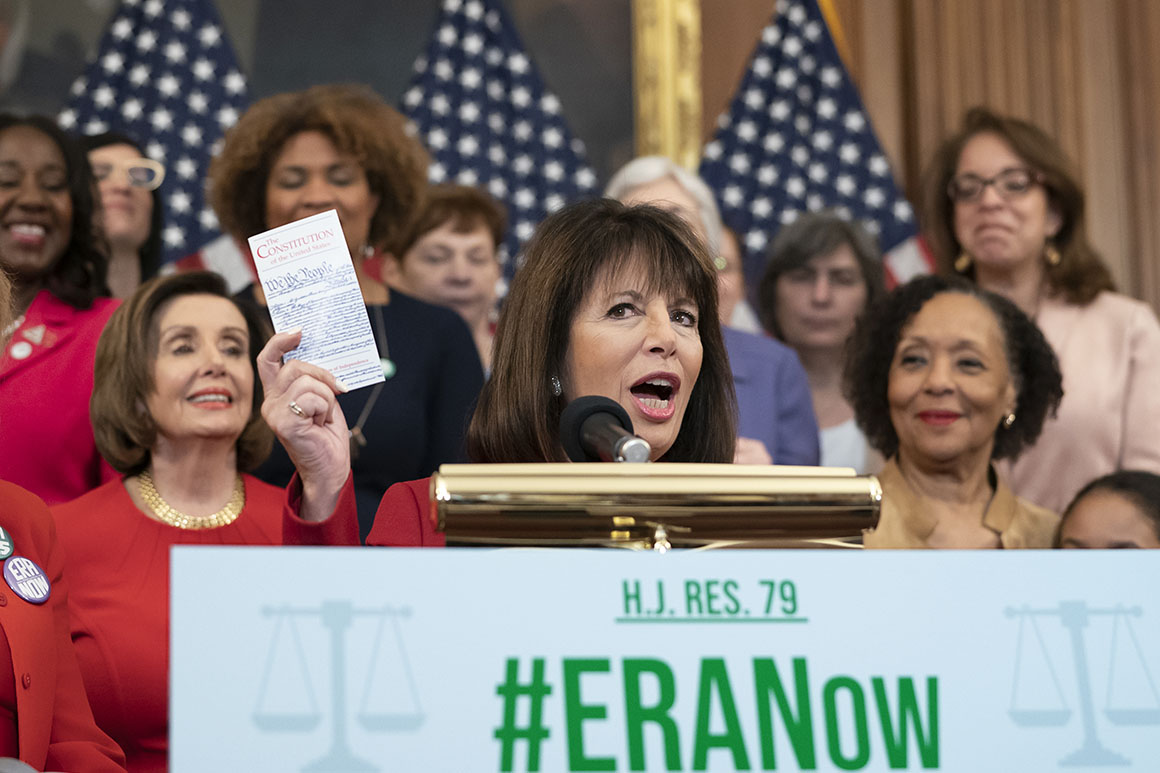
„I believe in one step at a time,“ Maloney, who has long championed the ERA in Congress, told POLITICO Wednesday. „The first step is to see how the vote goes, and if we get a strong Republican vote, the degree of probability of it passing in the Senate increases dramatically.“
The ERA resurfaced last month when Virginia voted to ratify it, pushing the amendment past the required 38-state threshold. But aside from the unlikelihood that the House bill will clear the Senate, the bid to revive the ERA has already drawn court challenges from those who believe Virginia’s vote came nearly four decades too late. Another potential legal difficulty is that five states that have rescinded their ratifications — though historically, such reversals have not been recognized by the courts.
First proposed in the 1920s, the ERA was adopted by Congress in the 1970s, but failed to win ratification from two-thirds of the states before a June 1982 deadline set by Congress. For most of its nearly 100-year-history, the ERA enjoyed bipartisan support, including from Presidents Richard Nixon and Dwight Eisenhower. But opposition from social conservatives in the 1970s prompted Republicans to drop it from their party platform in 1980, and to persuade the last few states needed to ratify not to do so.
„It’s more than time,“ Rep. Jackie Speier (D-Calif.), sponsor of H.J. Res. 79 (116), told POLITICO. „It’s almost laughable that we are one of only a handful of countries in the entire world to not have this in our Constitution. What are we afraid of?“
Since the crusade for ERA fizzled out in 1982, the GOP has made its peace with women working outside the home and other once-divisive feminist issues. But Republicans remain opposed to the amendment on the grounds that it might compel the federal government to pay for abortions — a claim some legal experts dispute. Some Republican lawmakers and advocacy groups say they’re also troubled by the amendment’s potential implications for pay equity, parental leave, pregnancy accommodations for workers, the expansion of transgender rights, and other policy matters.
In a rebuke to ERA supporters who accuse critics of the amendment of misogyny, it was mostly women GOP lawmakers who led debate against the bill Thursday.
„I detest discrimination in any form, against any group,“ Rep. Virginia Foxx (R-N.C.) said on the House floor. But „the goal of this legislation is different: The goal here is to expand access to abortion up to birth, and overturn the broadly supported policies that protect taxpayers from being forced to pay for abortions.“
A companion to the House bill, sponsored by Sen. Ben Cardin (D-Md.) and co-sponsored by GOP Sens. Lisa Murkowski (R-Alaska) and Susan Collins (R-Maine), has been introduced in the Senate. But it’s unlikely McConnell will move either measure, and less likely still that President Donald Trump will sign them.
„Fortunately, attempts by the abortion lobby to ratify this amendment are based on wishful thinking,“ Susan B. Anthony List President Marjorie Dannenfelser said following the vote. „This resolution is dead on arrival in the U.S. Senate.”
But that doesn’t mean Democrats are giving up just yet: “They have the votes to pass it [in the Senate] if they can get a vote on the floor, so the challenge is going to be persuading seven or eight Republicans to allow for cloture,“ Speier insisted.
For supporters, the House vote is a long-overdue step toward achieving gender equality in the U.S.
„It’s fundamental human rights language,“ Jessica Neuwirth, co-president and co-founder of the ERA Coalition, told POLITICO. „If we were writing our Constitution today, it would be in there.“
But opponents on the right argue the amendment constitutes a dangerous backdoor to unfettered access to taxpayer-funded abortion. Because any attempt at regulating abortion would only impact women, they point out, it could be ruled discrimination on the basis of sex under the ERA.
„Of course I believe in equal rights,“ Rep. Jackie Walorski (R-Ind.) said on the House floor before Thursday’s vote. But „let’s be honest, this is not about equality or women’s rights. This is about enshrining unrestricted abortion in the Constitution and allowing full taxpayer funding for abortion.„
Republican lawmakers and attorneys general, backed by Trump’s Justice Department, maintain that, consequences aside, Congress lacks the legal authority to alter a ratification deadline. But Democrats and ERA supporters reply that Congress never had the right to set a deadline in the first place, pointing to several constitutional amendments throughout U.S. history that had no deadline for ratification.
The only certainty is that the issue will end up in federal court: „Both sides are suing each other, and I think it’s going to the Supreme Court,” Maloney predicted.
Justice Ruth Bader Ginsburg said Monday that supporters would be better off introducing a new ERA, as a separate bill authored by Maloney would do, than trying to revive the original one.
Some legal experts say that if the deadline repeal becomes law, the ERA will automatically become part of the Constitution.
“The deadline removal will make the ERA unquestionably part of constitutional law,” CUNY professor Julie Suk, who is writing a book on the ERA, told POLITICO.
But even then, the five states that voted to rescind their ratification — Idaho, Kentucky, Nebraska, Tennessee and South Dakota — could argue in court that, even with the deadline revoked, the ERA lacks sufficient state support to be adopted. This is a last-resort option, legal experts say: In the past, constitutional amendments have been added to the Constitution despite rescinded state ratifications.
Supporters say they will persevere regardless.
„This has nothing to do with the abortion issue,“ Speaker Nancy Pelosi said. „That’s an excuse — it’s not a reason.
„It has everything to do with respect for women. Your daughter, your sister, your wife, your mother.“
Source: politico.com
See more here: news365.stream






